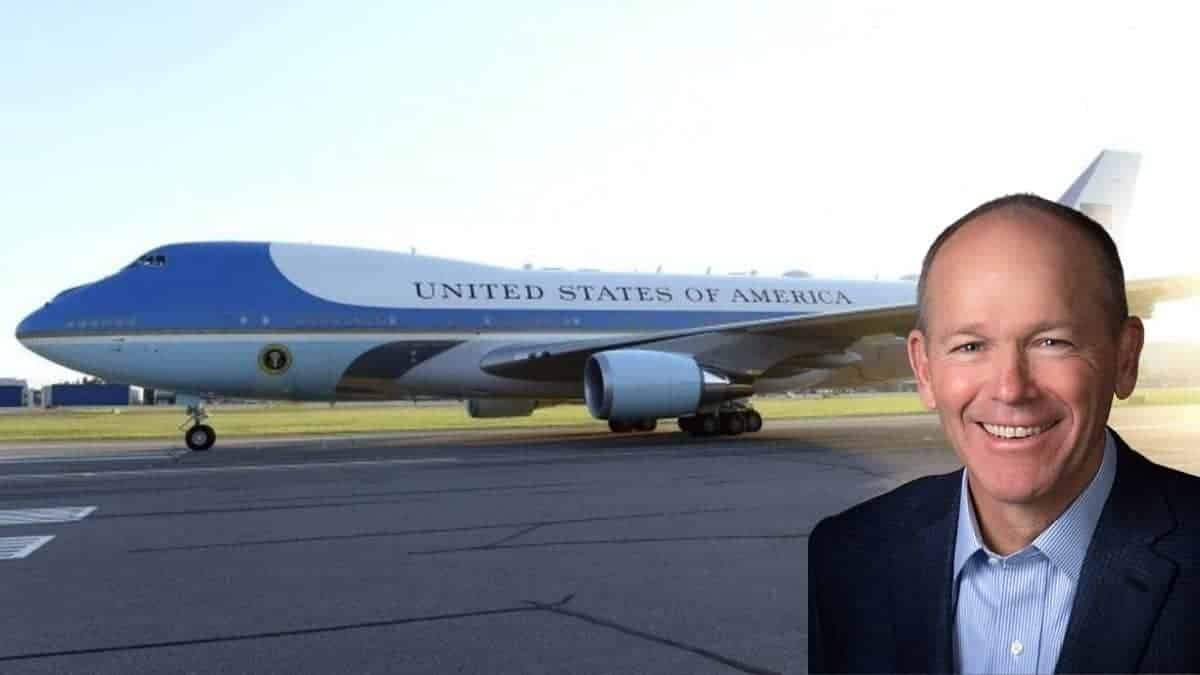Boeing CEO David Calhoun says company lost $660 million dollar making Air Force One

Boeing reported a $1.2 billion loss in the first quarter, owing to huge write-downs and losses in both its civilian and defence aircraft sectors.
The loss exceeded Wall Street’s predictions, and the company’s quarterly sales also fell short of projections. Boeing depleted its cash reserves by $3.2 billion.
On CNBC, CEO David Calhoun admitted to a “messier quarter than any of us would have preferred.”
Calhoun apparently sparked a Twitter trend during the company’s earnings call when he reportedly regretted the financial damage caused by a 2018 deal negotiated with then-President Donald Trump’s government to deliver two replacement Air Force One jets.
BREAKING: Boeing CEO David Calhoun says company executives should not have agreed to former President Trump’s terms for the new Air Force One. The company today announced it lost $660M building the two planes
— Marcus Weisgerber (@MarcusReports) April 27, 2022
BREAKING: Boeing CEO David Calhoun says company executives should not have agreed to former President Trump’s terms for the new Air Force One. The company today announced it lost $660M building the two planes
— Marcus Weisgerber (@MarcusReports) April 27, 2022
From the archives (December 2016): Boeing CEO says Air Force One will cost less than $4 billion after meeting with Trump.
Boeing Co. BA, -8.99 percent, based near Chicago, had its stock drop 10% shortly after the market opened on Wednesday. The stock was by far the worst performer among the Dow industrials, falling 0.97 percent.
However, Boeing expressed hope for the future, stating that it has submitted plans to begin 787 aircraft deliveries and that production and deliveries of the 737 Max passenger plane grew during the quarter.
Despite the pressures on the business’s defence and commercial development programmes, Calhoun said the company was on target to achieve positive cash flow for the entire year.
Boeing stockholders received bad news in the quarterly report on multiple fronts.
The projected first delivery of a new version of the company’s long-range, twin-aisle 777 passenger jet has been put back by at least a year, to 2025. The move was widely expected as Boeing adjusts to new certification criteria in the wake of regulators’ approval of the Max, which was later forced to be grounded following two catastrophic crashes.
Boeing forecasted $1.5 billion in “abnormal” production expenses as a result of the 777-9’s probable clearance delay.
Boeing announced a $660 million charge for its new presidential Air Force One plane programme, blaming it on higher supplier costs, final technical requirements, and scheduling delays. It also charged $367 million on a military training plane.
Boeing announced that it has submitted proposals to the Federal Aviation Administration to resume 787 passenger aircraft deliveries. Production concerns have prevented delivery for more than a year, resulting in a cost increase of roughly $2 billion, of which $312 million was recorded in the first quarter.
Airlines are anticipating a busy summer, with travellers returning in large numbers after a pandemic that lasted two years. However, some of them, such as American Airlines, have reduced their summer schedules due to the fact that they have yet to get the Boeing 787s that they ordered years ago.
“They’ve got a jam-packed summer itinerary.” “We’ve already let them down in terms of capacity on that summer timetable,” Calhoun said. The FAA will decide when Boeing can resume 787 deliveries, but Calhoun said, “We will be back in the skies sooner rather than later.”
In the current quarter, which runs through June, Boeing intends to increase 737 Max output to 31 planes per month. After two catastrophic crashes, the plane was grounded for over two years around the world.
Boeing also incurred pretax expenses of $212 million as a result of Russia’s invasion of Ukraine. The corporation did not provide an explanation for the write-down right away.
Boeing is taking initiatives to improve long-term performance, according to a memo from Calhoun to staff.
“We are a long-cycle industry,” he explained, “and the success of our efforts will be assessed in years and decades, not quarters.”
Boeing’s commercial-airplanes sector lost $859 billion, hampered by the company’s failure to produce 787 jets while it works to correct production issues.
The defence sector, which has historically been a bulwark against the instability of airline aircraft sales, lost $929 million as revenue plunged 24%.
The corporation recorded a $1.22 billion loss attributable to shareholders, up from $537 million the year before. On revenue of $13.99 billion, the “core” loss was $2.75 per share. According to a FactSet survey, analysts predicted a loss of 25 cents per share on revenue of $16.02 billion.


